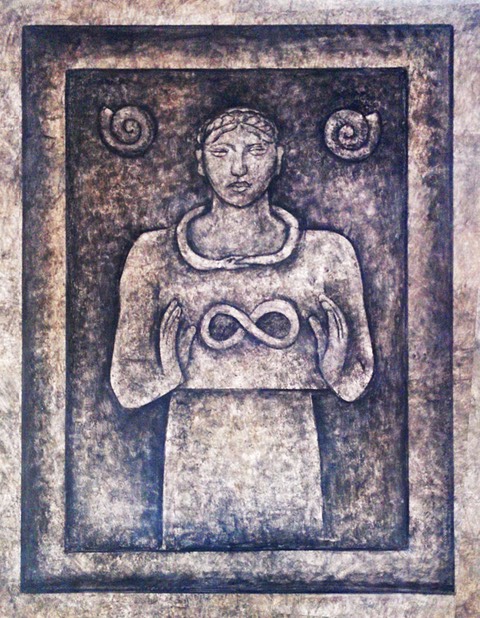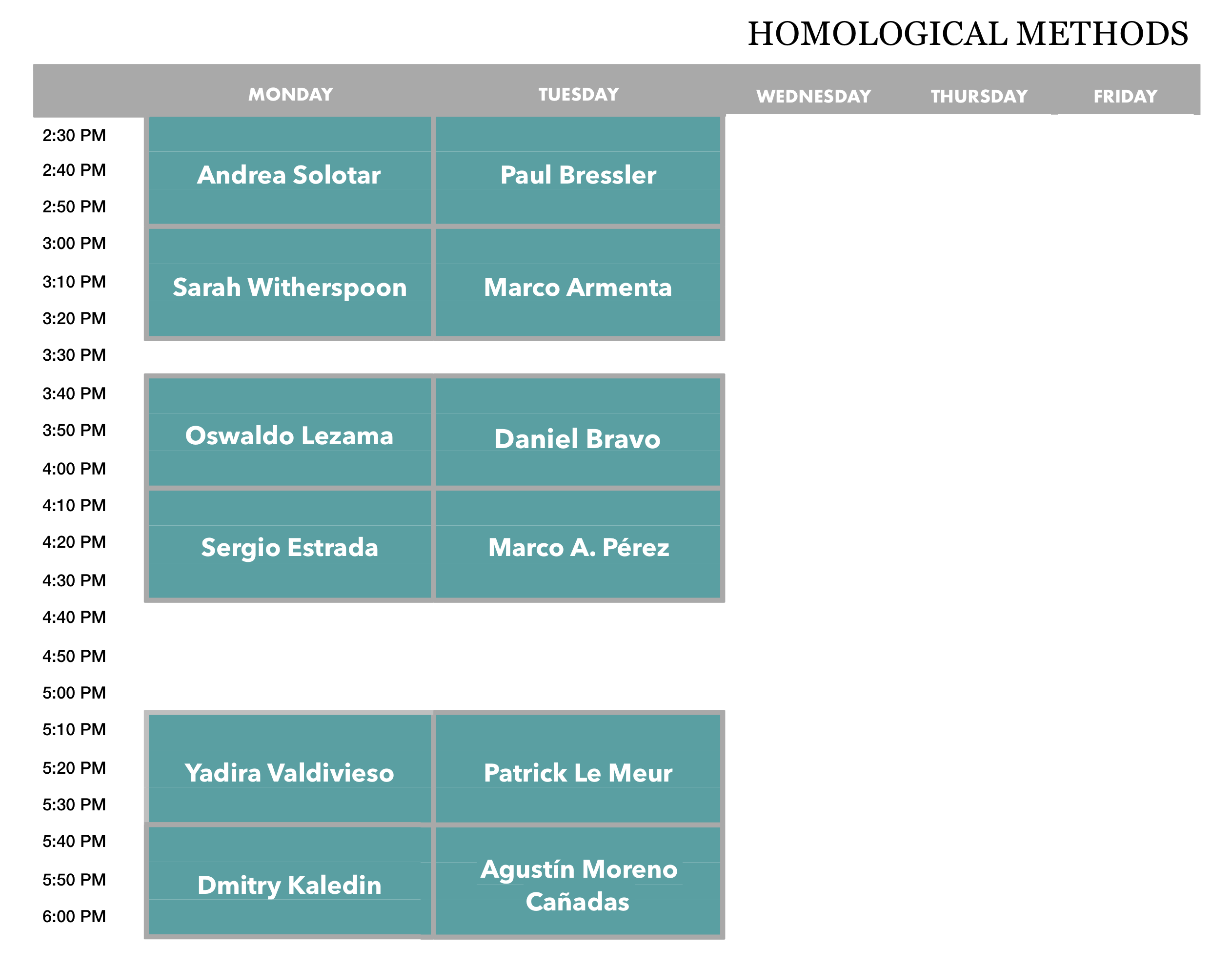Session on Homological Methods:
Monday, August 5
14.30-15.00
Andrea Solotar (Universidad de Buenos Aires, Argentina)
Split bounded extension algebras and Han's conjecture
For an extension of algebras $B \subseteq A$ with $A$ flat over $B$, A. Kaygun obtained a Jacobi--Zariski long exact sequence which relates usual Hochschild homology of $A$ and $B$ with the relative Hochschild homology. We obtain a Jacobi-Zariski long exact sequence in a somehow different situation, as follows. A $B$-bimodule $M$ is called bounded if $M$ is $B$-tensor nilpotent, of finite projective dimension as a $B$-bimodule and projective as a left or right $B$-module. A split bounded extension algebra is a split extension $A = B\oplus M$ with $M$ bounded.
We prove that the class $\mathcal{H}$ of finite-dimensional algebras which verify Han's conjecture is closed under split bounded extensions. More precisely if $A = B \oplus M$ is such an extension, then $A$ belongs to $\mathcal{H}$ if and only if $B$ belongs to $\mathcal{H}$. The proofs make use of the Jacobi-Zariski long exact sequence, and of the reduced relative bar resolution.
This is a joint work with Claude Cibils, Marcelo Lanzilotta and Eduardo Marcos.
15:00-15:30
Sarah Witherspoon (Texas A & M University, USA)
The Gerstenhaber bracket on Hochschild cohomology
The Hochschild cohomology of an algebra is both an associative algebra and a graded Lie algebra. We will discuss some recent results leading to better understanding of the Lie structure. We will focus on Volkov's homotopy lifting method for defining brackets by way of an arbitrary resolution for algebras over a field, and methods developed with Negron for computing brackets on resolutions that are differential graded coalgebras. We will discuss some examples.
15:40-16:10
Oswaldo Lezama (Universidad Nacional, Colombia)
Point modules for finitely semi-graded rings
In this short talk we study the set of point modules for finitely semi-graded rings. A standard Zariski topology will be defined for them as well as the point functor. In particular, the parametrization of the point modules for the quantum affine $n$-space is computed, and from this, the set of point modules for some important examples of non $\mathbb{N}$-graded quantum algebras is presented.
16:10-16:40
Sergio Estrada (Universidad de Murcia, Spain)
The stable category of Gorenstein flat sheaves on a noetherian scheme
A classical result due to Buchweitz says that the singularity category of a Gorenstein local ring $A$ is equivalent to the homotopy category of totally acyclic complexes of finitely generated projective modules. The latter is also equivalent to the stable category of finitely generated Gorenstein projective modules. This second equivalence extends for general noetherian rings and without the finiteness assumption on the modules. In 2011 Murfet and Salarian introduced an optimal non-affine replacement for the homotopy category of totally acyclic complexes of projectives. But the question of the non-affine analogue for the stable category of Gorenstein projective modules remained open. In the talk we will propose and show evidences to justify that the stable category of cotorsion and Gorenstein flat quasi-coherent sheaves is one natural candidate for this. As an application, we give a characterization of Gorenstein schemes by using these sheaves.
This talk is based on a joint work with Lars Winther Christensen and Peder Thompson.
17:10-17:40
Yadira Valdivieso (University of Leicester, UK)
From the potential to the first Hochschild cohomology group of a cluster-tilted algebra of surface type.
The objective of this talk is to give a concrete computation of the dimension of the first Hochschild cohomology space of a cluster tilted algebra in terms of a numerical invariant arising from the potential. We show that this invariant has a geometric interpretation using the geometric model of the cluster tilted algebra of type $A$, $D$ and $\widetilde{D}$.
This is a joint work with Ibrahim Assem, Juan Carlos Bustamante and Sonia Trepode.
17:40-18:10
Dmitri Kaledin (Steklov Institute / NRU HSE, Russia)
Deformations of abelian categories
Deformation theory of abelian categories has been constructed some time ago by Wendy Lowen, and the results are roughly similar to the theory for associative algebras; in particular, square-zero extensions are classified by Hochschild cohomology classes. However, in the abelian category setting, there is a much more direct way to build the theory, and it can even handle some situations the usual theory cannot, such as $\mathbb{Z}/p^2\mathbb{Z}$ considered as a square-zero extension of $\mathbb{Z}/p\mathbb{Z}$. This has been around for some time as a sort of folklore result but to the best of my knowledge, nothing was ever written down. I am going to present this story. This is joint work in progress with Wendy.
Tuesday, August 6
14.30-15.00
Paul Bressler (Universidad de Los Andes, Colombia)
Deligne groupoid revisited
To a differential graded Lie algebra whose components vanish in degrees $-2$ and below one associates two simplicial sets:
(1) the simplicial set of solutions of the Maurer-Cartan equation in differential forms on simplexes with values in the Lie algebra, and
(2) the nerve of the Deligne 2-groupoid.
I will describe a map (equivalence) between (1) to (2) given in terms of non-abelian multiplicative integrals.
15:00-15:30
Marco Armenta (CIMAT Guanajuato, México)
Derived invariance of the Tamarkin-Tsygan calculus of an algebra
The Gerstenhaber algebra structure of Hochschild cohomology has been proved to be a derived invariant. By proving derived invariance of the cap product in Hochschild theory, we get derived invariance of the Lie module structure of Hochschild homology over Hochschild cohomology. Then we prove derived invariance of Connes' differential. Therefore derived equivalent algebras have isomorphic differential calculi in the sense of Tamarkin-Tsygan. This is a joint work with B. Keller and it is part of my Ph.D. thesis under the supervision of José Antonio de la Peña and Claude Cibils.
15:40-16:10
Daniel Bravo (Universidad Austral de Chile, Chile)
$FP_n$-injective objects, cotorsion and torsion classes
In $R$-modules the class $FP_n$-Inj, of $FP_n$-injective modules, is introduced as a generalization of the class of injective modules, with respect to the class $FP_n$, of finitely $n$-presented $R$-modules (which in turn, can be thought as a refinement of finitely generated and finitely presented modules). Several properties about this relative injective class have been investigated. For example, conditions on the ring $R$ so that $FP_n$-Inj is the right half of a hereditary cotorsion pair. The class of $FP_n$-injective modules and its properties have also been studied in other contexts such as chain complexes; more recently progress have been made in the more general context of Grothendieck categories.
In this talk, we will see how the class of finitely $n$-presented modules allows for a generalization of hereditary and semi-hereditary rings, which we will call $n$-hereditary rings, study its homological characterizations and how over these rings the class $FP_n$-Inj forms part of a torsion pair. We will then tackle the question of how the much of this torsion pair situation can be generalized to other setting such as chain complexes and if time allows to certain Grothendieck categories.
This is part of an in-progress joint work with Sinem Odabasi, Carlos Parra and Marco Pérez. Partially supported by CONICYT + FONDECYT/Regular 1180888 grant
16:10-16:40
Marco A. Pérez (Universidad de la República, Uruguay)
Locally type $FP_n$ and $n$-coherent categories
In this talk we will study finiteness conditions in Grothendieck categories by introducing the concepts of objects of type $FP_n$ and checking their closure properties with respect to short exact sequences. This allows us to propose a notion of locally type $FP_n$ category as a generalization of locally finitely generated and locally finitely presented categories. We will also present the injective objects that are Ext-orthogonal to the class of objects of type $FP_n$, called $FP_n$-injective objects, which will be the right half of a complete cotorsion pair.
As a generalization for the category of modules over an n-coherent ring, we will present the concept of n-coherent categories. Such categories will provide a setting in which the $FP_n$-injective cotorsion pair is hereditary, and where it is possible to construct (pre)covers by $FP_n$-injective objects. If time allows, we will see how $n$-coherent categories provide a suitable framework for a nice theory of Gorenstein injective homological algebra.
This is a joint work with Daniel Bravo and James Gillespie.
17:10- 17.40
Patrick Le Meur (Université Paris Diderot, France)
Skew Calabi-Yau algebras
Skew Calabi-Yau algebras are generalisations of Calabi-Yau algebras. They were discovered by Reyes, Rogalski, and Zhang in 2014. Their relevance comes from the fact that a connected graded algebra is skew Calabi-Yau if and only if it is (Artin-Schelter) regular. As a special feature, skew Calabi-Yau algebras are equipped with a so-called Nakayama automorphism.
The talk will survey this class of algebras from various points of view such as methods to construct them, properties of their Nakayama automorphisms, and connections to representation theory.
17:40- 18.10
Agustín Moreno Cañadas (Universidad Nacional de Colombia, Colombia)
Matrix Problems Associated to Some Brauer Configuration
Brauer configuration algebras were introduced recently by E.L. Green and S. Schroll as a generalization of Brauer graph algebras in order to deal with the research of algebras of wild representation type. Such algebras are induced by suitable Brauer configurations which have a rich combinatorial structure. In this talk we describe the use of Brauer configurations in order to establish bijections between solutions of the four subspace problem, the Kronecker problem and the semilinear Kronecker problem and indecomposable projective modules over some Brauer configuration algebras. Specialization of these kind of algebras have been interpreted recently as shares in visual cryptography schemes.
References:
[GS] E.L. Green and S. Schroll, Brauer configuration algebras: A generalization of Brauer graph algebras, Bull. Sci. Math. 141 (2017), 539-572.
[S] D. Simson, Linear Representations of Partially Ordered Sets and Vector Space Categories, Gordon and Breach, London, London, 1992.
[ZM] A.G. Zavadskij and G. Medina, The four subspace problem; An elementary solution, LinearAlgebra Appl. 392 (2004), 11-23.

